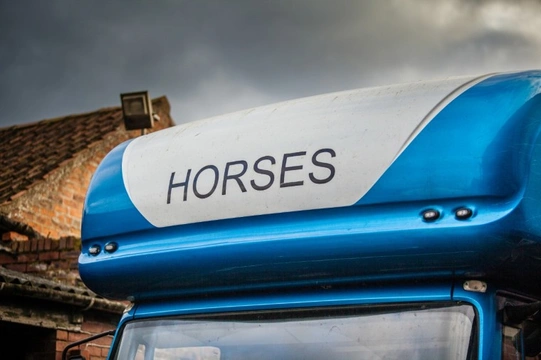
What is the best way to travel your horse?
The main options to travel a horse are on a trailer with a 4-wheel drive vehicle, a small lorry of 3.5 tonnes or a larger lorry of 7.5 tonnes and upwards. The best choice for your horse depends on your budget, competition schedule, driving licence and to some extent, your horse’s preference
Licences
The law changed in 1997 so now only older drivers are still allowed to tow a trailer or drive a lorry up 7.5-tonne in weight without having to take a further test.
If you have a driving licence issued after that date then you will need to take an additional trailer test to be able to tow and you may only drive lorries up to 3.5 tonnes in weight on your car licence. This is why the smaller lorry/van conversions have become so popular. Heavier weighted vehicles require additional training and an exam. Anything over 7.5 tonnes are classified as Heavy Goods Vehicles (HGV) and there are different levels to this test. The HGV requires days of training and is difficult to pass and, costly.
How to choose the best vehicle?
This is all about preference, practicality and finance. For local travelling, a trailer and 4x4 may be no more than you need.But if you use the four-wheel-drive vehicle as your main car, you might find it expensive to run. 3.5-tonne lorries are not only a hit because of their category on the modern driving licence but also because they generally drive like a car, not a lorry. They are much cheaper to fuel than big lorries and go through on a standard Class 7 MOT. From 7.5 tonne upwards, these lorries require an annual test or plate at an approved centre. Usually, they are serviced and then put through the plate test and a ballpark figure for this is around £1,000.
Why are 3.5-tonne lorries so popular?
3.5-tonne lorries are perfect for your average local horse owner. They are easy to drive, cheap to fuel and don’t require any additional annual test other than an ordinary MOT. Not every MOT testing station will offer a Class 7 test but they are pretty easy to find and only slightly more expensive than an MOT for a car.
The main challenge with these new lorries is finding a reputable supplier or manufacturer. The popularity of 3.5-tonne lorries has not gone unnoticed by many coachbuilders from the reputable to the unscrupulous.There are some high spec luxury boxes around and there are also some cheap, very unsafe conversions. It is particularly important that there is a reinforced steel bulkhead between you and the horse otherwise there is nothing other than a flimsy divider between the driver and at least half a tonne of 7.5-tonne horseflesh. Check the mileage carefully as many chassis are very high mileage before they are converted leaving you with an expensive coach on an old engine that really is fit for nothing other than the breakers yard.
What does the horse think?
Some horses do not travel well in certain vehicles or at all. Some dislike trailers or need to travel as a sole horse with the partition out, others travel less well on lorries with high ramps and don’t want to stand herringbone. Some horses load and travel well all their lives, for others, if they have had a bad experience or been introduced to travelling by someone inexperienced, travelling is always traumatic.
How to buy safely
Trailers are simpler to buy as they don’t have any mechanical elements to them. Check the brakes and the floor which is difficult if the rubber mats are sealed and you can’t put it over a pit. Many people insist on aluminium floors but wooden floors are fine provided they are looked after properly.
It is ideal if you can take a mechanic with you when buying a lorry. For larger lorries, it is really helpful to take someone who is used to servicing and maintaining horseboxes. MOT and plate testing looks at the integrity of the vehicle as a lorry or van, it does not consider the precious cargo it is carrying. Many people are astounded to know that there is no check done on the floor of the lorry at plate but this is not part of their remit. An experienced haulier who is used to looking after horseboxes is an ideal person to glance over a lorry that you would like to buy.
The best towing vehicle
This definitely a question for your local equine Facebook group. Try and probe a little deeper as most people don’t always give reasons why they like or particularly dislike a vehicle. User experience cannot be bettered and you are talking to people who have their 4x4 for the purpose you will so are keen on safety, economy, reliability and storage space. Horsey people just love to have their say and you can gather some very helpful information to assist you in your research for the right vehicle.



